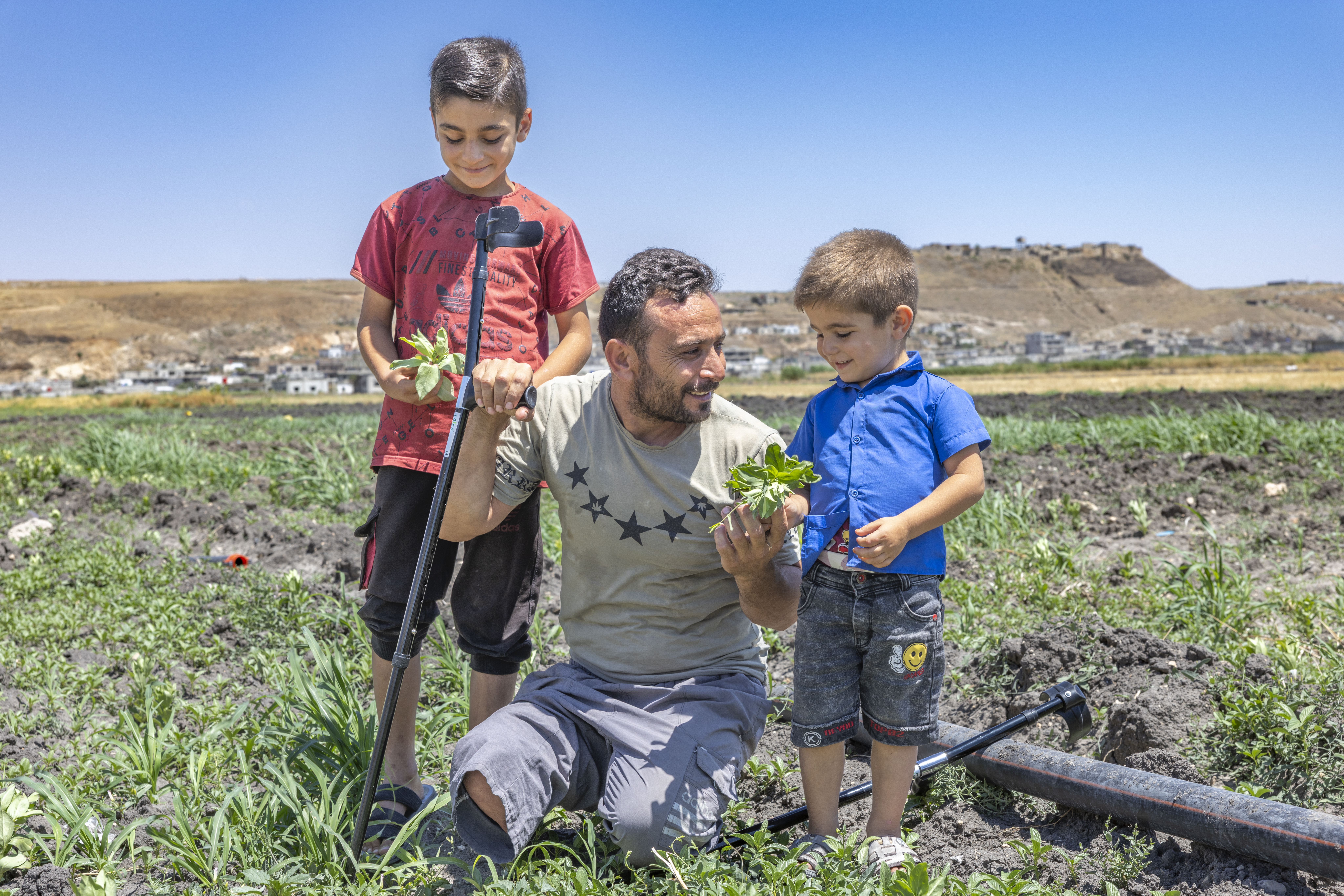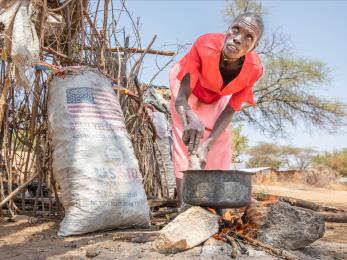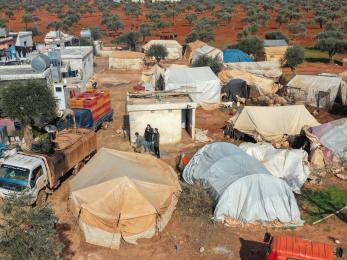Teen Syrian refugee boy looks for community in Iraq
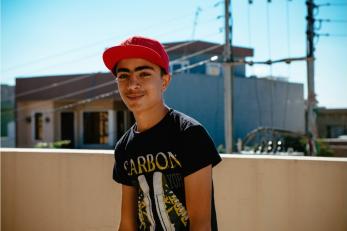
Somehow Hussein conjured up a portable loudspeaker in no time flat. Sepan, a 15-year-old Syrian refugee, had just revealed his love of hip-hop and now, as if by magic, he was plugging his smartphone into the speaker. As the bright winter sun lit up the community center’s patio, Sepan hit play and music roared out into the quiet neighborhood.
The sound drew new kids off the street. Together with the youth coaches, they crowded around, bobbing their heads and clapping as Sepan danced. For the first time since his family fled the war in Syria, Sepan had an audience.
None of this was planned. Sepan and a crowd of other boys showed up on the patio that day, asking when programs at Mercy Corps’ new community center would begin. They had heard this would be a place to gather, to play sports, to learn English and computers, to make art. The hitch was that center wasn’t officially open, computers and other equipment had yet to arrive, and Hussein, the program manager for Mercy Corps' community center, was inside still training coaches.
The boys’ presence — premature though it might have been — showed that here, on the outskirts of Erbil, Iraq, the boys were hungry for these programs. It was almost as if they turned the patio of the soon-to-be community center into a reverse Field of Dreams: “If you come, they will build it.” The coaches dug up a soccer ball and the boys kicked it around, laughing.
Then suddenly, they left. It was time to get to school for the afternoon shift, but Sepan stayed back. He can’t go to school because the cost of transportation to and from school is $40 a month. That’s money his family just doesn’t have.
It’s a common experience for young Syrian refugees here; less that one in five Syrian boys are enrolled in school in Erbil. For girls, it’s only one in nine. Seventy percent of kids under age 17 don’t have access to safe spaces outside their home. Mercy Corps is trying to change that. The youth center will be more than a gathering place — it’s a tool to build a stronger community.
Home away from home
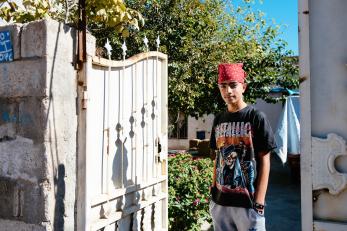
Sepan opened the gate from the street to reveal a small courtyard inside, and a shabby couch under the tree. There is so little public green space in Iraq that this little patch of garden where his family can gather outside feels like an improbable luxury.
Sepan and his family — including three older siblings and their spouses and children — live in a small, spare house in the working-class neighborhood of Kaznazan. Iraqi Kurdish families primarily live there, but in recent years, the war in Syria and Iraq’s own battles with anti-government forces have brought newcomers seeking safety.
Sepan’s family fled from Al Hasakah in Syria three years ago. His father, Jamal, says life in Syria was hard, even before the war. “We were oppressed two times,” Jamal says. “First, because we were Syrian and there was no democracy in Syria, and then because we were Kurds.” Kurds are the largest ethnic minority in Syria and have long been a target for oppression and discrimination.
Once the war started, things got worse. A family member left the Syrian Army. Fearing collective punishment, Jamal sold the family’s sheep and cows to raise money for their escape to Iraq. “It was not easy to have a deserted soldier [in the family] and to live in Syria. It would have been very dangerous,” Jamal said.
Sepan has big brown eyes and a direct gaze, but he is soft-spoken. At first, he was happy to go to Iraq’s Kurdish region, he says. “I was imagining that everything good was here.”
But what he found was something different. “I was disappointed. I thought my life would be better, but it isn’t. I was not able to continue my education. I was not able to get a job. All those were closed.”
He says he’s lonely here. He loves break dancing, and in Syria, he had friends who shared that interest. Some are in Europe now; others came to Iraq.
“But they all got separated,” he says, “so I don’t know what happened to them.”
At a time when social life and peer groups are all-important, it’s easy to see how a teenage boy without a home, a school, or a community would feel profoundly isolated.
A place to connect
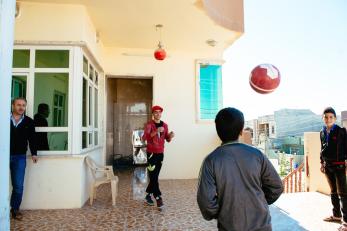
The new community center is just a short walk from Sepan’s house. It represents a cornerstone of Mercy Corps’ efforts to change the reality for Sepan and other vulnerable teens like him.
Hussein Omer, program manager, says teens frustrated by a lack of positive opportunities are at a high risk for alienation from their community or worse, being pulled into extremist groups.
With the community center, he says, “Mercy Corps is innovating a new path for reaching those adolescents.”
The center offers informal education, safe spaces for social connection, and programs that help teens develop positive life skills. The team opening the community center asked the kids in the neighborhood what activities they most want, and Sepan is pushing for a dance troupe. He says if enough people are interested, he’ll teach them how to dance.
Jamal sees this as a chance to improve Sepan’s experience in Iraq. He’s clearly worried about his son.
“If you open this dance course or hip-hop course it would be great and make him very happy,” says Jamal. “And other children also like this. When the center is open, other children can join Sepan.”
A moment in the spotlight
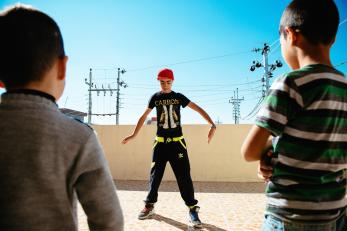
Sepan lit up when he felt the bass vibrate through his bones. He popped his joints in precise and improbable ways, to the enthusiasm of the coaches on the community center’s patio.
It’s a moment that could chip away at the misunderstanding Sepan describes in his new neighborhood. “Some people do not understand what dancing is. They tell us it’s a dirty thing, it’s a nasty thing. They don’t know what dancing is.”
Of course, when you’re an adolescent, you don’t have to be a refugee to feel alienated from the community around you. But it definitely doesn’t help. Being displaced from your home and peer group can bring with it a feeling of becoming erased, invisible from the world.
But at the community center, in front of the small crowd, Sepan seems to become larger instantly.
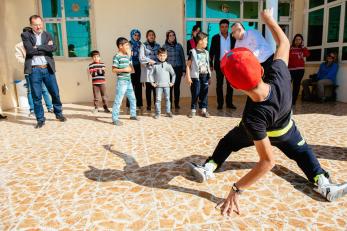
“I am alive when I perform in front of people,” he says. “I feel good about myself. I feel that I’m becoming something.”
In the small audience, something else is growing too. This group, thrown together by war, loneliness and need, also contains the seeds of friendship and resilience. They’re just getting started, but together they’re growing a new place to make themselves at home.
